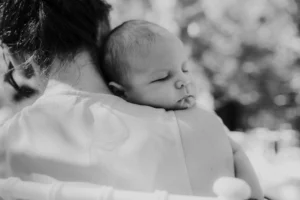It’s Sunday evening. You’ve had a wonderful weekend with maybe a birthday party, a later-than-usual dinner, or just some cozy downtime indoors. Your toddler heads to bed, but instead of drifting off easily, they’re restless, tossing and turning. By midnight, they’re awake again, calling for you. Sound familiar?
At Rocky Mountain Sleeping Baby, we know parents are always looking for answers to bedtime battles. New research suggests that it’s not just naps, routines, or bedtime snacks at play here. Light exposure throughout the day and evening can have a surprisingly big impact on your toddler’s and even your baby’s sleep.
Why Light Matters for Pediatric Sleep
When we think about pediatric sleep, we usually focus on bedtime routines and consistency (both of which are key). But scientists are now pointing to light as one of the most powerful regulators of little ones’ body clocks.
In July 2025, researchers introduced a new sleep model showing that toddlers’ internal rhythms can get thrown off when:
- Daytime light is too dim. Staying indoors without enough natural sunlight can confuse their body’s sense of “daytime.”
- Evenings are too bright. Prolonged exposure to lamps, screens, or late summer sunlight delays the brain’s signal that it’s time for rest.
- Weekends shift routines. Later mornings or extra-bright evenings on weekends can make Sunday night sleep especially tricky.
In short: baby sleep and toddler sleep aren’t just about when kids go to bed. It’s about how their bodies interpret light and dark over the entire day.
Practical “Light Hygiene” for Better Baby & Toddler Sleep
The good news? Parents don’t need special equipment or rigid schedules. Just a few mindful adjustments can make a big difference for pediatric sleep health:
✨ Boost daytime brightness
Get outside for at least 30–60 minutes of daylight, especially in the morning or around lunchtime. Even cloudy outdoor light is far stronger than indoor bulbs.
🌙 Soften the evenings
Dim lights about an hour before bed. Choose warm-toned lamps over bright overheads. Think “sunset inside the house.”
📆 Keep weekends steady
Try not to swing bedtime and wake time by more than an hour, even on weekends. Consistency helps toddlers’ and babies’ internal clocks stay on track.
🪟 Darken the sleep space
Use blackout curtains or shades to block streetlamps, summer sunsets, or early sunrises from creeping into the bedroom.
📱 Limit screens close to bedtime
Blue light from tablets, phones, or TVs tells the brain it’s still “daytime.” Save shows for earlier in the day and swap in calming, screen-free activities before bed.
A Gentle Reminder for Parents
At Rocky Mountain Sleeping Baby, we remind families that life isn’t always predictable and that’s okay. Birthday parties, vacations, and family gatherings will happen (and should!). What matters is creating a baseline of light awareness most days, so that when things get a little off track, your toddler’s system is more resilient.
By weaving in mindful light habits, you’re not only helping your toddler or baby sleep more soundly tonight, but you’re also supporting their long-term circadian health.
So next time bedtime battles pop up after a busy weekend, remember: sometimes the answer isn’t in the bedroom at all. It’s in the light your little one soaked up (or didn’t) during the day.
At Rocky Mountain Sleeping Baby, we specialize in helping families find simple, practical solutions for better baby sleep and toddler sleep. If you’re ready to bring more peace to your evenings, explore our sleep resources or reach out today. We’re here to help your whole family rest easier.





